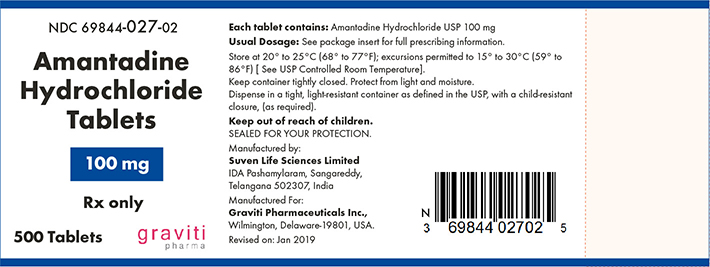
Amantadine Hydrochloride Tablet while Breastfeeding
What is Amantadine Hydrochloride Tablet used for?
Amantadine Hydrochloride Tablet while breastfeeding safe or not? Can there be any side effects for infant while using it during breastfeeding?

Pregnancy: Teratogenic Effects: Pregnancy Category C: The effect of amantadine on embryofetal and peri-postnatal development has not been adequately tested, that is, in studies conducted under Good Laboratory Practice (GLP) and according to current recommended methodology. However, in two non-GLP studies in rats in which females were dosed from 5 days prior to mating to Day 6 of gestation or on Days 7 to 14 of gestation, amantadine hydrochloride produced increases in embryonic death at an oral dose of 100 mg/kg (or 3 times the maximum recommended human dose on a mg/m2 basis). In the non-GLP rat study in which females were dosed on Days 7 to 14 of gestation, there was a marked increase in severe visceral and skeletal malformations at oral doses of 50 and 100 mg/kg (or 1.5 and 3 times, respectively, the maximum recommended human dose on a mg/m2 basis). The no-effect dose for teratogenicity was 37 mg/kg (equal to the maximum recommended human dose on a mg/m2 basis). The safety margins reported may not accurately reflect the risk considering the questionable quality of the study on which they are based. There are no adequate and well-controlled studies in pregnant women. Human data regarding teratogenicity after maternal use of amantadine is scarce. Tetralogy of Fallot and tibial hemimelia (normal karyotype) occurred in an infant exposed to amantadine during the first trimester of pregnancy (100 mg P.O. for 7 days during the 6th and 7th week of gestation). Cardiovascular maldevelopment (single ventricle with pulmonary atresia) was associated with maternal exposure to amantadine (100 mg/d) administered during the first 2 weeks of pregnancy. Amantadine hydrochloride should be used during pregnancy only if the potential benefit justifies the potential risk to the embryo or fetus. Nursing Mothers: Amantadine hydrochloride is excreted in human milk. Use is not recommended in nursing mothers.
Nursing Mothers: Amantadine hydrochloride is excreted in human milk. Use is not recommended in nursing mothers.
Amantadine Hydrochloride Tablet Breastfeeding Analsys
Amantadine hydrochloride while Breastfeeding
Low RiskCAS Number: 665-66-7
Antiviral used for treatment and prophylaxis of type-A Influenza. Since it is a dopamine agonist is also used to treat Parkinson’s disease. At latest update relevant published data on excretion into breast milk were not found. Because of large volume of distribution and low plasma level observed (Pacifici 1976), a passage of significant amount through breastmilk or side-effects on the infant are not likely to occur. Amantadine reduces plasma levels of prolactin, it has been used to treat galactorrhea caused by the use of dopaminergic neuroleptic drugs (Siever 1981 Correa 1987, Marken 1992, Carvalho 2011), however there is not information about the effect on lactating mothers. Prolactin is important to milk production especially during the first few weeks within birth. Frequent and effective stimulation of the nipple by the infant is essential on the maintenance of breastfeeding. Whether administered during breastfeeding, it would be advisable not to use it in the neonatal period and monitor milk production.
Amantadine Hydrochloride Tablet Breastfeeding Analsys - 2
Amantadine hydrochloride while Breastfeeding
CAS Number: 768-94-5
It is probably best to avoid amantadine during breastfeeding because of its potential negative effect on lactation.

What should I do if I am breastfeeding mother and I am already exposed to Amantadine Hydrochloride Tablet?
Amantadine Hydrochloride Tablet is in the category of low risk, if you have already used it then its not a big deal if health and behavior of baby is good. However your health care provider shall be aware of the fact that you have used Amantadine Hydrochloride Tablet so you should inform him based on your convenience.
I am nursing mother and my doctor has suggested me to use Amantadine Hydrochloride Tablet, is it safe?
Though Amantadine Hydrochloride Tablet dose not comes in category of safe drugs rather it comes in category of low risk but if your doctor is aware that you are breastfeeding your baby and has still recommended it then its advantages must be outweighing the risks.
If I am using Amantadine Hydrochloride Tablet, will my baby need extra monitoring?
Not much monitoring required while using Amantadine Hydrochloride Tablet
Who can I talk to if I have questions about usage of Amantadine Hydrochloride Tablet in breastfeeding?
US
National Womens Health and Breastfeeding Helpline: 800-994-9662 (TDD 888-220-5446) 9 a.m. and 6 p.m. ET, Monday through Friday
UK
National Breastfeeding Helpline: 0300-100-0212 9.30am to 9.30pm, daily
Association of Breastfeeding Mothers: 0300-330-5453
La Leche League: 0345-120-2918
The Breastfeeding Network supporter line in Bengali and Sylheti: 0300-456-2421
National Childbirth Trust (NCT): 0300-330-0700
Australia
National Breastfeeding Helpline: 1800-686-268 24 hours a day, 7 days a week
Canada
Telehealth Ontario for breastfeeding: 1-866-797-0000 24 hours a day, 7 days a week
